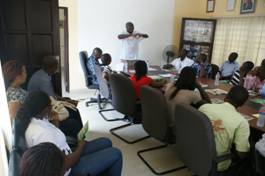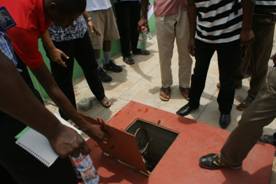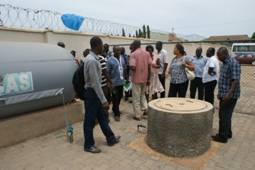Ghana
TRIP TO BIOGAS TECHNOLOGIES AFRICA LIMITED – WASTE-TO-ENERGY

THURSDAY, 18TH APRIL 2013
(Follow-up to ACP Biofuel Workshop)
A field trip to the Biogas Technologies Africa Ltd company on Thursday 18th April, 2013, was a follow up to the two-day ACP Workshop in Ghana on Production of non-food, bio-oil supply chain for renewable energy in Ghana: needs, challenges and opportunities from 2 - 3 April, 2013. Participants from the ACP Workshop, and faculty, research/teaching assistants and graduate students from the Department of Marine & Fisheries Sciences (MAFS) and the Institute of Environment and Sanitation Studies (IESS), all of the University of Ghana, participated in the field trip (Annex A). The aim of the trip was to encourage participants to explore the opportunities of biogas as fuel for domestic and institutional applications. Participants also had the opportunity to visit biogas digester systems that were set up by the company for domestic use at Dr. Idans home and for small scale use at the Tema International School.
PRESENTATIONS OF OPPORTUNITIES IN BIO WASTE TECHNOLOGY
Dr. George Wiafe thanked Dr. John Idan, the CEO of Biogas Technologies Africa Ltd, for hosting the meeting on the premises (Figure 1a). He expressed his enthusiasm for the work that was being done and urged the participants to use the opportunity to further develop ideas.
Dr. Idan welcomed the group and gave an interesting presentation on Waste to Energy which discussed the various ways in which waste could be transformed into energy (Figure 1b). He began the talk with a preamble about dedication and focus, with an analogy of the patience of the cassava farmer in waiting for harvest. He explained the history of toilet facilities in Ghana from Atonko (holes with planks covering it), through pit latrines to aqua privy (water closet) and ventilated improved pit latrines. In his introduction, he challenged the present generation on waste management with regards to the increasing population. There were various contributions from the participants on what could be done, including:
- Finding innovative ways to manage waste
- Exploring various different means for preventing the exposure of faecal colliform, for health reasons
- Ghanaians must be concerned about the disposal of waste matter
According to Dr. Idan’s presentation, about 1600m3 of sewage is dumped into the sea at ‘Lavender Hill’ near the Korle-Bu Hospital in Accra, Ghana. He explained that the faecal waste could be concentrated into an airless area, to remove as much water as possible, make the water available for reuse and use the faecal matter as fertilizer and the gas generated in the airless chamber for other purposes.
A second presentation was given on Financing Waste-To-Energy (A case for financing energy, climate change and Green Economy in Africa – Organic waste and its potential as a renewable energy source from the African perspective). The presenter, an employee at the company, explained the principle of energy from biogas and the inevitable emission of biogas from bio-waste which will contribute to climate change.
Describing Green Economy as sustainable production and consumption of energy mainly via the biogas supply chain, Dr. Idan explained that anaerobic digestion of biodegradable waste is by far the only proven technology that closes the production-consumption loop: i.e., we eat, then discharge, recycle and reuse and then eat again. To conclude, different streams of biodegradable waste in Africa were outlined such as agro-processing, domestic waste, etc., in addition to biogas projects built and installed by Biogas Technologies Africa Ltd. in Africa, including the treatment of cow dung into electricity at Chicualacuala in Mozambique, biogas plants in the Accra Mental Hospital, Koforidua Hospital, Regent Hotel, Fiesta Royale Hotel and other industries in Ghana.
|
|
Figure 1a: Introduction to the meeting and field visit by Dr. Wiafe |
Figure 1b: Welcome of participants and presentation by Dr. Idan |
During the interactive session, the following issues were discussed:
- Septic tanks could not be used in place of anaerobic digesters since they are porous and built with cement instead of burnt bricks
- It takes a minimum of 2 weeks to produce gas in the anaerobic digester. Every One-third of 1 kg of bio-waste generates gas
- The effectiveness of the biogas compared to propane gas
- Self-reliance instead of waiting for assistance from government in making changes related to sanitation issues and projects. The need for creativity, aggressiveness and being proactive in dealing with challenges
FIELD VISITS TO INSTALLED BIOFUEL DIGESTOR SYSTEMS
The field component of the trip involved the survey of two of the biogas digester systems that were installed by Biogas Technologies Africa. The first set up was at Dr. Idan’s house (Figure 2) where the biogas produced was used for some domestic applications.
|
|
Figure 2: Inspection of biogas installation at Dr. Idan’s home |
|
The second survey was of a biogas digester setup at the Tema International School. The proprietor of the school gave a tour and the history of the school’s installation. The setup had effectively replaced the original two septic tanks and improved the sanitation of the school. In addition to the reduced maintenance costs, there were additional benefits of biogas generation that was supplied to the school kitchen and recycled nutrient rich water that was used to water the school lawns.
|
|
Figure 3: The biogas digester at the Tema International School |
|
Participants were interested in knowing the response of the parents to the production of cooking gas from faecal matter. In response, the proprietor explained that the school had already been involved in other green projects that the parents were already aware of. As a result, most parents were in support of the programme. There were also additional plans for using the produced gas in the science laboratories and incorporating kitchen waste into the biodigestor.
The field trip concluded with enthusiastic discussions among the participants on the various possibilities for setting up biogas digestors, even at the domestic level.
Annex A: Participants List for Visit to Biogas Technologies Ltd.
|
Name |
Organization |
Telephone |
1 |
David Adigbli |
IESS, Legon |
0249205661 |
2 |
Edem John Akubia |
IESS, Legon |
0209366771 |
3 |
Naomi Adraki |
IESS, Legon |
0541823147 |
4 |
Michelle Clottey |
MAFS-UG, Legon |
0262652598 |
5 |
Miriam Y. Amewornor |
MAFS-UG, Legon |
0248989510 |
6 |
Edna E K Quansah |
MAFS-UG, Legon |
0242321762 |
7 |
Amadi A Sefah-Twerefour |
MAFS-UG, Legon |
0207708412 |
8 |
Barbara Baidoo |
IESS, Legon |
0245743566 |
9 |
Francis Yeboah |
IESS, Legon |
0245373208 |
10 |
Gifty Nyekodzi |
IESS, Legon |
0246973063 |
11 |
Donatus Angnuureng |
University of Bordeaux, France |
0246630489 |
12 |
Vidzro Francis |
IESS, Legon |
0242558659 |
13 |
John Essien |
IESS, Legon |
0207167273 |
14 |
Benet A Foli |
MAFS-UG, Legon |
0244967536 |
15 |
Robert Yankey |
Ghana Atomic Energy Commission |
0277194330 |
16 |
Adelina Mensah |
Univ. of Ghana |
0244842018 |
17 |
Ted Annang |
Univ. of Ghana |
0204336677 |
18 |
George Wiafe |
Univ. of Ghana |
0244657475 |
19 |
Bright Frimpong |
IESS, Legon |
0244942019 |
20 |
Agyapong Wiredu |
IESS, Legon |
0244489936 |
21 |
Abadi K A Abdulai |
IESS, Legon |
0246014633 |
22 |
Henry Asante |
IESS, Legon |
0542670675 |
23 |
Kwame Agyekum |
MAFS-UG, Legon |
0244671350 |
Ghana
Concept note title
POTENTIAL POWER GENERATION FROM BIOGAS AT THE UNIVERSITY OF GHANA
Problem statement
Ghana is presently in an energy crisis because of a shortfall in energy production from the major sources of hydroelectricity and thermal power. There is a high demand for power throughout the country as the nations develops and expands infrastructure. The Volta River Authority (VRA), Electricity Corporation of Ghana (ECG) and their partners are currently implementing a load shedding programme to help manage available power to all consumers.
Acutely hit by this crisis are educational institutions, hospitality and entertainment centres where large populations aggregate at a time for various reasons. The demand for power in these educational centres such as the University of Ghana for domestic use, teaching and research is very high but useful to help drive the growth of the economy of Ghana. To help address the shortfall in energy, such bodies resort mainly to power generation from generators run on fossil fuel. The burning of fossil fuel in large quantities, it is known, contributes to greenhouse gas CO2 emissions and therefore the global climate change. Continuous use of such fossil fuel is, additionally, expensive and not sustainable.
The University of Ghana is the premier and largest University among eight (8) public Universities in Ghana. It has a student population of over 40,000 with some at the City campus and others coming in during vacations for regular students as distance learning students. This means that throughout the twelve months in a year there is a significant population on the main Legon campus. Added to the student population is staff that provide administrative and support services to academic staff numbering about 5,000; a significant number of which live in and around the Legon campus. There are various commercial centres such as restaurants, banks, hairdressing salons, and business centres on campus. This total population on the Legon campus generates a significant quantity of domestic waste that could be tapped for biogas production and subsequent energy provision to support teaching, research and other business activities on both the campus and its outlying communities.
Project
Four new halls of residence currently housing an average of 1700 students have been fitted with biogas facilities to help manage generated sewage. These biogas facilities will have to be developed to tap the gas produced for energy provision. There are eight (8) other students’ halls of residences on the same campus which do not have the biogas facility. Their sewage system needs to be reworked and fitted with the biogas facility for subsequent energy provision. When all the 12 halls of residences are well fitted, they will be able to generate enough biogas and therefore enough energy to the extent that the Legon campus and its outlying communities could eventually wean itself from the national power grid thereby easing the demand for power nationally as well as helping to reduce CO2 emissions. This will drive sustainable businesses in and around the campus as well as afford a congenial atmosphere for education and research. Such a model on the University of Ghana campus can eventually be extended to the seven (7) other public Universities, as well as national hospitals and secondary schools throughout the country. Ghana will be on the road to sustainably use biofuel sources in support of its energy requirements.
Project activities will therefore include:
- Fitting biogas infrastructure following BTWAL model (Mr. Idun’s) to remaining eight halls of residence
- Re-fitting biogas infrastructure in the four new halls to conform with BTWAL model
- Piping all the gas from the 12 hostels to a central infrastructure where power would be generated
- Generated power supplied to all hostels, teaching and administrative areas, as well as outlying communities up to about 10 km radius
- Building a large business centre / shopping mall to use the power as well as generate funds to support the venture
- Set up a green area (recreational park) where the large population on campus can have leisure and this will include some water sports.
Project timeline
All should be in place, given available funds, within a maximum period of three years.
Project risks
- Buy-in of project by the University of Ghana administration
- Technical expertise
- Damage to pipelines
- Regular maintenance of infrastructure
- Pungent smell in the air
- Gas blowout.
Project Stakeholders
- Biofuel network in Ghana
- University of Ghana
- Energy Commission
- BTWAL (Mr. John Afari Idun)
- Communities surrounding the campus





